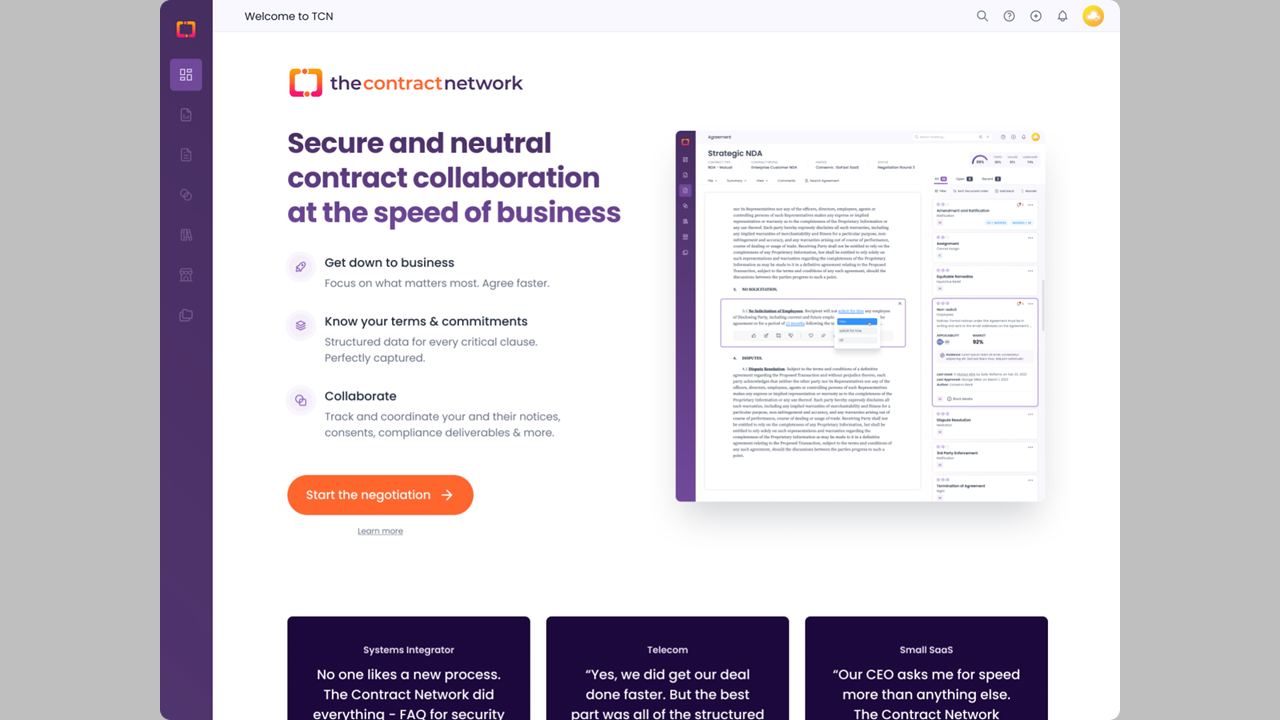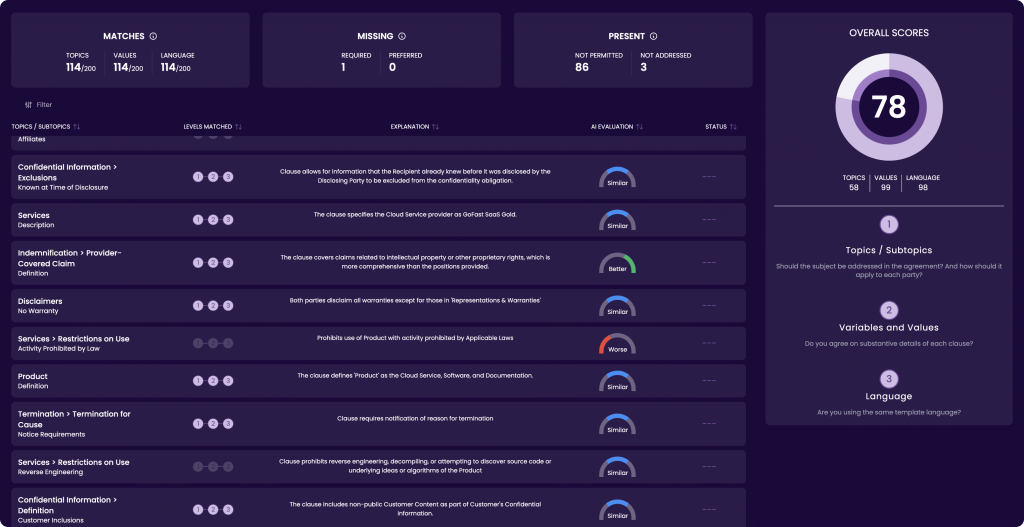A new company coming out of stealth today, The Contract Network, aims to “radically accelerate the time for contract negotiations” by providing an AI-powered collaboration platform that can be used by all parties to a transaction to more quickly “get to the point” in their negotiations.
It is led by CEO Jim Wagner, who has a track record of starting successful legal tech companies, and it has already partnered with Mayo Clinic to build a solution to accelerate the negotiation of clinical trials agreements.
“The concept behind the business is that B2B contract negotiation takes too long, and that businesses need a platform where both sides can collaborate to get deals done faster and to manage their compliance obligations,” Wagner told me.
Wagner was the cofounder first of DiscoverReady and then of Apogee Legal, an enterprise contract analytics platform. In 2018, Seal Software acquired Apogee, after which Wagner became president of Seal. In 2020, Seal was acquired by DocuSign, where Wagner became vice president of agreement cloud strategy. Since 2021, he has been founder and managing principal of Lean Law Labs.
Coming Out of Stealth
Together with cofounder Bill Murphy, former chief technology officer at Blackstone, and others, Wagner has been developing the platform in stealth mode for over a year.
The company announced its Mayo partnership April 11 and is formally launching today. Mayo is also an investor in the company.
“We’re excited to get underway and tell the world what we’re doing with more detail, start showing the product to a lot of folks, and start the process of getting folks early access,” Wagner said. He expects to get others live on the system by early summer.
Wagner said that clinical trials were an ideal use case for the company to start with because so much is at stake in developing new medical treatments but the negotiation processes for clinical trials agreements are complex and time-consuming, leading to significant delays in the launch of clinical trials.
“We envision a world where businesses collaborate with respect to their agreements seamlessly, achieve outcomes faster, and share vital information, deadlines, and milestones without friction,” Wagner said in announcing the Mayo partnership. “We are incredibly proud to make clinical trial agreements the first use case for our collaborative platform and to have the opportunity to play an integral role in promoting growth and innovation in such a meaningful context.”
A Collaborative Environment
In an interview last week, Wagner said his career has shown him that many of the problems with contracts need to be solved before the contracts get signed, because once they are signed, “it is quite an effort to put Humpty Dumpty together again from an operational and compliance perspective.”
As Wagner described it, The Contract Network (TCN) platform is a collaborative environment where all parties to a contract negotiation can participate. In this way, it addresses three issues that other contracting tools fail to address:
- The siloing of contracts data. Contracts are valuable business assets, but their value is not just to one party or the other. While it is becoming more broadly recognized that contracts create valuable data, that data remains siloed with one party or another. But when that data involves, say, a delivery date, or a required action, it is to both parties’ benefit that they both have access to that data.
- The clumsiness of compliance. When a compliance issue does come up, it is all being handled via email — no current CLM platform addresses that issue. “That’s the dirty little secret behind contract compliance, that it all takes place in email,” Wagner said. “It ought to take place in a secure, neutral platform.”
- The redline rut. No matter what type of contract automation platform any one party uses, once the draft is generated, it then falls into the same redline rut that has characterized contracting for decades, of parties sending comments back and forth, usually by email. TCN’s hypothesis is to provide an environment where all the parties can come in and collaborate and get to the point much faster, and all have tools available to them such as generative AI to facilitate the process.
Wagner said that platform is not designed to compete with the glut of CLM products on the market or everything those products do with regard to the contracts workflow and lifecycle.
“But when it comes time to publish that agreement to a counterparty, we’re saying, ‘Wait a minute. Instead of just sending it out into email and starting this red line rut, why don’t we have a place where the parties can go to get deals done?’ And that’s the platform that we’re building.”
In what Wagner describes as Moneyball for contracting, the platform will also deliver market data about what is being done in other negotiated contracts from within the network, as a way of providing transparency. “You’re asking for an insider trading restriction in this nondisclosure agreement. The transparency is, that only appears in 12% of all NDAs in this context. We think that market data is invaluable.”
While TCN is launching with its partnership with Mayo Clinic to tackle clinical trials agreements, Wagner said there are a number of areas in which parties are stuck in a sort of Groundhog Day of repetitive negotiation cycles, including mergers and acquisitions and commercial real estate.
Integrated AI
During our interview last week, Wagner gave me a preview of some of the platform’s key features, including AI.
To start a new negotiation, the user can either upload a draft created using a different CLM platform or by using templates stored within TCN. But from the first draft forward, Wagner says, TCN treats the key points of the agreement as data.
“Even though it looks like we’re working on a traditional agreement, in fact, any point that is likely to be negotiated, any point that has to be managed proactively from an obligations management perspective, we’re going to have made that point data from the first draft.”
Every time a party to the negotiation makes a change in the draft, the other party is notified of the change and also provided with a summary created by generative AI. “Every time we pass the agreement back and forth, every change that happens is now captured with AI and we’re going to give you a summary of everything that changed.”
Although not yet live as of my demo last week, Wagner said the platform would also be able to provide generative edits to drafts.
TCN calls its approach “AI for everyone,” reasoning that it makes no sense to have one party using advanced technology and the other left to antiquated approaches.
“If you’re negotiating on The Contract Network, you are going to have the right tools at your disposal, including the latest in artificial intelligence, at every step of the process,” the company says.
At the conclusion of a negotiation, TCN will ask each user if they would like to save the decisions that they made from the negotiation and create a profile. This profile effectively becomes a playbook, but one, as Wagner put it, that is embedded in the negotiations and that is inferred from the user’s actions, but that the user can then update and modify.
Wagner calls it making language part of your déjà vu. “Every time you’re negotiating, you have the ability to layer onto your profile to make it more and more robust, more effective, so as you use The Contract Network more, you see fewer and fewer new things.”
While different parties do not have access to each other’s profiles, they do both get essentially the same view of the agreement being negotiated, They can each make changes and comments via the platform or simply give thumbs up or thumbs down to specific clauses.
Getting Parties Onboard
Given that the platform requires both parties to participate, I asked Wagner if he sees that as a hurdle, in that one party may want to use the platform while another may not.
That is a challenge, he acknowledged, but he said they are addressing it by offering so many incentives for parties to participate.
“You’re going to have data from the first draft, you’re going to have collaborative obligations, management and contract compliance in a way that you simply won’t otherwise have, and you’re going to get to your agreement significantly faster than being stuck in the traditional red line route.”
Also, there is no charge to counterparties who are invited onto the platform as guests. They are able to come on and negotiate the agreement and get all the platform’s benefits at no cost.
“From the very first time that you touch the application, you’re going to have market data that you and no one else has ever had. From the first time that you touch this, you’re going to have data from the first draft in terms of your contract compliance. And now you’ve got every date-deliverable deadline, you’ve got all of those things available to you from the first draft. So we’re very focused on how we can get counterparties to come in and say, ‘You know what, this is actually a worthwhile experience for me. I would love to be a part of it.'”
Much of the funding for the business so far has come from Wagner and his cofounder. In addition to the Mayo Clinic, The LegalTech Fund is also an investor, as are a number of individuals who include leaders of major legal tech businesses, Wagner said.
Other executives joining Wagner and Murphy at TCN are Phil Richards, most recently the cofounder and CTO of Clairvoya (sold to
JLL-backed Breakwater Solutions), and Bettina Drake, most recently the COO and chief legal officer of eVestment, the analytics arm of NASDAQ.
TCN is currently accepting applications for early access. You can apply or request a demo at thecontractnetwork.com.
 Robert Ambrogi Blog
Robert Ambrogi Blog
